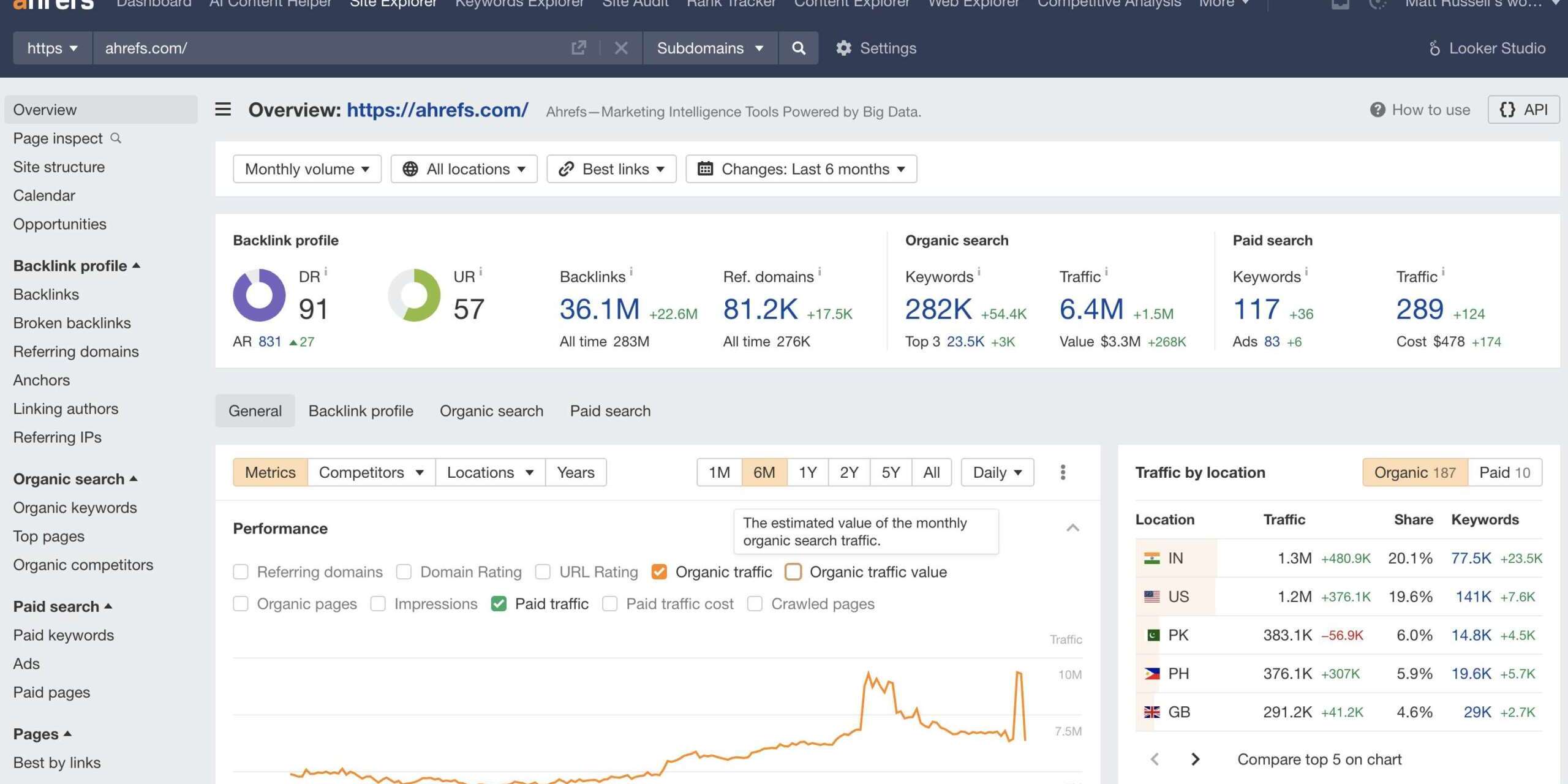If you have a website or have dipped your toe into the digital marketing world, you’re probably familiar with SEO. SEO, or Search Engine Optimization, involves optimizing your website to appear higher in the search engine results pages (SERPs) and rank for keywords your target audience is searching for. Seems simple, right? You use the right keywords, and boom, you’re on top! Well, not exactly… on-page SEO is just one part of it, and keywords are only a small part of that.
There’s an entire other side of SEO called “off-page,” which refers to factors that are outside the content on your page or even your meta descriptions. Off-page SEO involves elements that aren’t part of your website itself but still help improve its ranking on search engines. One of the key components of off-page SEO is backlinks. But what are they, and how do they work? We’ll cover all that and more in this blog.
Let’s break it down.
So, What Are Backlinks?
Backlinks are links from one website to another. When one website (the source) links to another (the destination), it creates a backlink. For example, if you’re writing a blog post on healthy eating, you might link to “recipe pages” or a “nutrition tips” page. That would create a backlink to those destination websites.

Why Are Backlinks Important For SEO?
Search engines, like Google, treat backlinks as votes of confidence. Think about it: by linking to another website, you’re telling your audience, “Hey, this source is credible, and you should check it out.” You would only do this if you believe the content is useful, accurate, and the source is reliable & trustworthy. Essentially, search engines see websites with more backlinks—or a higher domain rating (we’ll get to that later)—as more authoritative and reliable. This fits into their ranking factor of E-E-A-T: Experience, Expertise, Authoritativeness, and Trustworthiness.
In fact, according to studies by Backlinko, where they analyzed 11.8 million search results, they found that:
“Our data shows that a site’s overall link authority (as measured by Ahrefs Domain Rating) strongly correlates with higher rankings.”
“The #1 result in Google has an average of 3.8x more backlinks than positions #2-#10.”
So, in simple terms, Backlinks = votes of confidence on your behalf = higher search engine rankings.
Backlinks can also drive traffic directly to your site. When users click on links from other websites, they’re referred to your content, which can result in increased engagement and potential conversions.
How Do Backlinks Relate to Domain Rating (DR)?
So, how do backlinks relate to domain rating? Domain Rating (DR) is a metric used to assess the strength and authority of a website’s backlink profile. Basically, the amount and quality of your backlinks form your domain rating. One way to think about it is that the number and quality of positive reviews a restaurant gets from customers (backlinks) would affect the grade a restaurant ranking organization would give it.
- Backlink Profile Strength: DR quantifies the strength of a website’s backlink profile on a logarithmic scale from 0 to 100. A higher DR indicates a stronger, more authoritative backlink profile.
- Quality of Links: DR considers not only the quantity of backlinks but also their quality. Links from high-authority, relevant sites positively contribute to DR, while links from low-quality sites have less impact.

What Makes a Good Backlink?
It’s important to remember that you don’t want just any website linking to yours. It needs to be from a trustworthy, authoritative site with a higher domain rating than yours. Think of it like having your boss vouch for you at work—they’re transferring their authority over to you.
In addition to authority, the backlink needs to be relevant. The pages you’re linking to, or the backlinks you want to acquire, should be from a similar industry or service. For example, if you run a gardening website, backlinks from authoritative websites in the home and garden industry would be more valuable than backlinks from unrelated topics like tech or fashion.
Another thing to be aware of when it comes to what makes a good backlink is what “type” it is.
There are two types of backlinks: DoFollow and NoFollow.
- DoFollow Links: These are hyperlinks that transfer SEO value from the linking website to the linked site. This transfer of value, often called “link juice,” helps boost the linked site’s search engine rankings. These links signal to search engines that the content on the linked site is valuable and trustworthy.
- NoFollow Links: These hyperlinks don’t transfer SEO value to the linked site. They tell search engines not to treat the link as a ranking factor.
You’ll want to prioritize DoFollow links, as they are the source of “link juice” and will actually help boost your domain rating. That said, a mix of NoFollow and DoFollow links is also beneficial.
Google tends to value high-quality backlinks more than numerous low-quality ones, so it focuses on quality over quantity when acquiring backlinks.
How Do You Get Backlinks?
So cool — you now know what backlinks are, how they affect SEO, and what to look for in a “good” link. But how do you actually acquire them?
1. Guest Blogging
One of the most popular and effective ways is through guest blogging. This involves writing a blog post for an authoritative site from which you want a backlink. For example, if you have a gardening website and want to get a link from a landscaping company you admire, you would reach out to the site, offer to write a blog post, and request that they link back to your site.
2. Create Shareable Content
Another strategy is to create valuable, high-quality content on your own site that is highly shareable. Content like user guides, how-tos, infographics, and tutorials are extremely helpful and valuable, making other websites more likely to link to them. People in your industry will naturally want to share your content because it’s both excellent and relevant to their own audience.
3. Business Associations and Directories
You can also acquire backlinks from business associations you’re a part of, such as Chambers of Commerce, Business Network International, or the Better Business Bureau. Additionally, consider submitting your website to reputable business directories or local listings, like Google My Business, Yelp, or industry-specific directories.
4. Build Relationships
Networking with other businesses or influencers in your niche can also lead to mutual backlink opportunities. Collaboration and partnership can be as beneficial online as offline.

How Important Are Backlinks, Really?
As mentioned at the beginning of the blog, backlinks are just one part of off-page SEO, which itself is only half of the overall SEO equation. So, what is their importance compared to other aspects of SEO? Backlinks are a piece of the puzzle. They are not at the top of the food chain.
On-page and technical SEO, as well as the quality of the content on your website, are equally or even more important. Backlinks alone won’t guarantee high rankings if the on-page SEO is lacking or if the content itself isn’t of high quality. So, it’s most important to create useful, relevant, and high-value content and focus your efforts on that.
It’s best to focus on these foundational aspects of your site first and then gradually acquire backlinks and slowly build your domain rating.
Key Takeaways
- The more high-quality backlinks you have, the higher your domain rating, which can directly improve your search engine rankings.
- A good backlink comes from a reputable, authoritative site in a relevant industry.
- It’s not just about the number of backlinks you have; the quality matters most.
- It is not an overnight process.

Partner With Integrity Marketing For Your SEO Success
Building an effective SEO strategy goes beyond backlinks. It requires technical expertise, a deep understanding of search engine algorithms, and a tailored approach to your industry. At Integrity Marketing, we help small to medium-sized businesses in the Greater Seattle area grow their online presence through thoughtful SEO solutions.
Our team specializes in strategies that include:
- Creating high-quality SEO content designed to earn backlinks.
- Acquiring high-quality backlinks through our network of trusted bloggers.
- Building a professional, user-friendly website that impresses visitors and search engines alike.
- Managing your overall SEO efforts, from on-page and technical optimization to acquiring backlinks.
If you’re ready to establish a professional digital presence and grow your business, reach out to us today. Together, we’ll create an SEO strategy—including a backlink plan—that works for your business.
About the author
April Young
April is our Project and Content Manager, known for her strong communication skills. With years of experience in SEO, copywriting, project planning, and contract management, she excels in creating compelling website content and leading a dynamic team of copywriters, web designers, and contractors.





